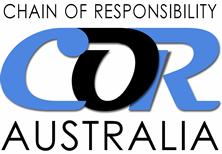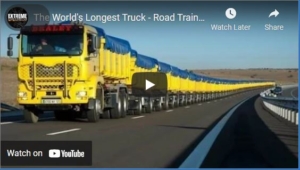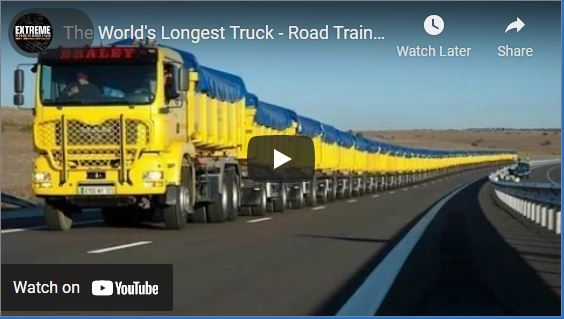Examples of Enforceable Undertakings Under CoR Law
/in Blog/by Steven AsnicarExamples of Enforceable Undertakings Under CoR Law

For companies that either provide, or engage other companies to provide heavy vehicle transport in Australia, an alleged breach of the Heavy Vehicle National Law (HVNL) and Chain of Responsibility (CoR) can be a daunting prospect. Many businesses may feel they have limited options when facing potential prosecution and penalties.
However, in certain cases, proposing an Enforceable Undertaking (EU) to the National Heavy Vehicle Regulator (NHVR) can provide an alternative path that avoids legal proceedings while still delivering improved safety outcomes.
Rather than punishment, an EU focuses on putting tangible measures in place to enhance safety systems, practices, and awareness across the offender’s business and often the wider industry.
Pursuing an EU isn’t necessarily an easy way out though. The undertakings require a significant investment of time, effort and resources by the offender to implement the proposed initiatives. However, for companies willing to learn from their mistakes and improve, an EU can be an opportunity to emerge as a safety leader and contribute to uplifting heavy vehicle transport standards.
Let’s examine some recent examples of EUs accepted by the NHVR and the types of activities involved.
What Is an Enforceable Undertaking?
To begin, we need to clarify what an EU is under the HVNL. An EU is defined as a written undertaking proposed by a person or legal entity as an alternative to prosecution for an alleged contravention. It allows an offender to voluntarily agree to carry out specific actions to address the identified compliance issues and improve the safety of their transport activities.
The key features of an EU are:
- It is a legally binding agreement between the offender and the NHVR.
- It is offered voluntarily by the offender as an alternative to court action.
- It requires the offender to admit the alleged contravention has occurred.
- It commits the offender to deliver tangible initiatives to rectify safety issues.
- It specifies clear timeframes and costs for completing the required actions.
Factors the NHVR Considers for Accepting EUs
When deciding whether to accept an EU, the NHVR will carefully consider the proposed undertaking to determine if it will deliver a strong safety outcome in the particular circumstances.
The key factors assessed include:
- Promoting safety improvements – Any changes to the offender’s systems, procedures, policies or staff training that will reduce risks.
- Benefiting the wider industry – The extent to which the proposed activities will improve safety beyond just the offender’s business.
- Addressing underlying issues – Any rectifications already made by the offender to address the factors that led to the alleged contravention.
- Specificity and measurability – The activities must be clearly described with measurable deliverables and milestones.
- Value of the commitment – The scale of the undertaking in terms of actions and costs should exceed what would be expected from a court-imposed penalty.
If an EU is accepted, the offender must complete all the specified actions within the agreed timeframe, which is typically 1-2 years. They must provide evidence to the NHVR that the EU conditions have been met. Failing to comply with an accepted EU is an offence.
Examples of Recent Enforceable Undertakings
To demonstrate how EUs are used in practice to address heavy vehicle safety issues, here are several examples accepted by the NHVR over the past few years.
EUs for Mass and Dimension Breaches
Some of the most common serious breaches of the HVNL relate to mass and dimension requirements. Overloaded or oversized vehicles pose major safety risks to drivers and other road users.
Here are some examples of EUs in this area (company names redacted):
1. New South Wales – Matthew Arthur Harrison t/a All Town Skips Pty Ltd
Date accepted: 18 September 2023
Alleged breach: In October 2022, Harrison operated a heavy vehicle that significantly exceeded the maximum allowable mass limits on two of its axle groups, constituting a severe breach.
Summary of undertaking:
- Complete training courses on fatigue management, mass management, and weight verification
- Implement monthly safety meetings for employees
- Make vehicle modifications
- Provide a charitable donation
The undertaking is estimated to cost $13,500 and be completed within a year.
2. New South Wales – CSG Resource Supplies Pty Ltd
Date accepted: 15 May 2023
Alleged breach: In July 2022, a heavy vehicle operated by CSG Resource Supplies had its second axle group weighed at 11.06 tonnes, 2.06 tonnes over the 9 tonne limit, a severe 22.8% overload.
Summary of undertaking:
- Provide load restraint training and testing for staff
- Update compliance documentation like safe work procedures and driver handbooks
- Hold a seminar on vehicle dimension requirements
These initiatives are estimated to cost $34,000 and be finished within 2 years.
3. New South Wales – Anthony KUSCHERT
Date accepted: 30 March 2023
Date completed: 24 August 2023
Alleged breach: In January 2023, Kuschert drove a heavy vehicle loaded with hay bales that were measured to be 200mm wider than the maximum permitted width of 2.64m, a severe width breach.
Summary of undertaking:
- Complete Chain of Responsibility and load restraint training courses
- Make a donation to a road trauma support charity
The undertaking has an estimated cost of $1,000 and a 6-month completion timeframe.
EUs for Load Restraint Breaches
Failing to properly restrain a load as required by the Load Restraint Guide is another common serious breach. Inadequately restrained loads can shift or fall off vehicles, endangering the driver and other motorists.
Some recent EUs for load restraint issues include:
1. Victoria – Lance Michael VOTTA
Date accepted: 30 January 2023
Date completed: 4 October 2023
Alleged breach: In May 2022, Votta operated a heavy vehicle loaded with dirt that had its drive axle weighed at 10.85 tonnes, 1.85 tonnes over the 9 tonne limit, a severe 20.56% overload.
Summary of undertaking:
- Undertake comprehensive training on mass management and load restraint
- Develop a simple mass limits guide sticker for distribution to businesses in his industry
The undertaking is estimated to cost $2,200 and be completed within a year.
2. Victoria – Katoomba Trading Pty Ltd
Date accepted: 29 November 2022
Date completed: 19 March 2024
Alleged breach: In November 2020, a heavy vehicle operated by Katoomba Trading had its front axle weighed at 5.9 tonnes, 1.4 tonnes over the 4.5 tonne limit, a severe 34% overload.
Summary of undertaking:
- Engage consultants to review safety protocols
- Implement improved mass management controls
- Audit subcontractors
- Hold an industry awareness session
These initiatives are estimated to cost nearly $70,000 and be finished within a year.
3. Victoria – Horsham Rural City Council
Date accepted: 15 August 2022
Date completed: 3 April 2024
Alleged breach: In July 2021, a heavy vehicle operated by the council had its steer axle weighed at 7.6 tonnes, exceeding the 6 tonne limit by 26%, a severe risk breach.
Summary of undertaking:
- Develop a Chain of Responsibility management system
- Deliver extensive load restraint training to staff and local industry
- Publish information about the undertaking on its website
The initiatives are estimated to cost $30,000 and be completed by November 2022.
EUs for Fatigue Management Breaches
Driver fatigue is a major cause of heavy vehicle crashes. Breaches of work and rest hour requirements are taken very seriously.
Here are some examples of fatigue-related EUs:
1. South Australia – Michel SAADA
Date accepted: 15 March 2023
Date completed: 19 March 2024
Alleged breach: In April 2022, Saada made a false or misleading entry in his work diary, recording that he was resting when his vehicle was detected driving during the claimed rest break.
Summary of undertaking:
- Complete a fatigue management training course
- Distribute educational materials to other drivers
- Make a charitable donation
- Use an electronic work diary for 12 months
The undertaking is estimated to cost $1,425 and be finished within a year.
2. Victoria – Cliffard McBride
Date accepted: 3 May 2022
Date completed: 2 February 2024
Alleged breach: Between July and August 2021, McBride was found to have exceeded the standard 12-hour work limit in a 24-hour period on 13 separate occasions while driving a fatigue-regulated heavy vehicle.
Summary of undertaking:
- Complete Chain of Responsibility training
- Assist with industry education on fatigue management
- Have his business audited
- Develop a training package
- Use an electronic work diary
The undertaking is estimated to cost nearly $30,000 and be completed within a year.
Common Themes and Best Practices From the EUs
Looking across the various EUs accepted by the NHVR, some clear themes and best practices emerge that point to the types of initiatives the Regulator sees as most effective:
- Putting staff and management through comprehensive training on safety and compliance by accredited providers. The two courses specific to CoR are TLIF0009 and TLIF0014. See more here: https://chainofresponsibilityonline.com.au/precourse
- Engaging external experts to audit and improve the offender’s safety management systems, policies and procedures
- Developing practical educational resources like handbooks, videos, and toolbox talks to increase awareness of key safety issues and regulations
- Hosting workshops and information sessions to share lessons with others in the industry
- Implementing IT systems to better manage compliance in areas like mass, fatigue, and maintenance
- Reviewing and strengthening subcontractor management (including contract reviews) to ensure all parties in the chain meet their obligations
Importantly, the NHVR expects the offender to go beyond just “fixing” their own operations and contribute to uplifting safety across the wider heavy vehicle transport sector. Many EUs therefore contain measures to communicate learnings to industry peers through training sessions, educational content, and the distribution of policies and other resources.
Take a Proactive Approach to CoR Compliance and Safety
For companies facing a potential HVNL prosecution, proposing an EU can be a constructive way to avoid legal action while still being held accountable. The undertakings require a major commitment from the offender but also provide an opportunity to implement meaningful change and demonstrate industry leadership on safety.
Ultimately though, the goal should be to stay out of trouble in the first place. By taking CoR responsibilities seriously and proactively managing risks, you can protect your business, people, and reputation.
As a leading provider of Chain of Responsibility training and audit/consulting services, CoR Australia is well-placed to assist businesses in strengthening their compliance to avoid breaches in the first place. Whether you’re looking to educate your workforce, audit your current systems, or implement best-practice controls, our team of experts can provide the guidance you need.
For more information on how CoR Australia can support your business with CoR compliance, please contact us here.
Author
About CoR Australia
CoR Australia is the Australia’s premier provider of comprehensive Chain of Responsibility (CoR) training, compliance, and audit services. Our mission is to empower businesses across Australia to navigate the complex landscape of CoR legislation with confidence and ease.
Expertise You Can Trust
With years of experience and a deep understanding of the National Heavy Vehicle Regulator (NHVR) regulations, our team of experts delivers tailored solutions to help companies of all sizes achieve and maintain compliance. From small businesses to large corporations, we have the knowledge and tools to support your unique needs.
Comprehensive Training Solutions
Our nationally recognized training programs, developed in collaboration with the Transport Logistics and Industry Skills Council, combine online, distance, remote classroom, and face-to-face delivery methods to ensure effective and efficient education for your entire organisation. Whether you need general awareness training for staff or specialised courses for executives and managers, CoR Australia has you covered.
Compliance and Audit Preparation
In addition to our training services, we offer compliance consulting and audit preparation to help your business stay ahead of the curve. Our team will work closely with you to develop customised CoR compliance systems and provide the support you need to confidently face any NHVR inspections or audits.
Your Partner in CoR Success
At CoR Australia, we understand that the world of Chain of Responsibility can be daunting. That’s why we’re committed to being your trusted partner, supporting you take the important steps towards your company “taking every reasonably practicable measure” to ensure safety, mitigate risk, and maintain compliance.
Get Started Today
Don’t wait until you’ve had a visit from an NHVR inspector to prioritise CoR compliance. Contact CoR Australia today to learn more about how we can help your business thrive in the face of evolving regulations. Together, we’ll create a safer, more responsible supply chain for all.
Leave a Reply
What is “Primary Duty” in the Chain of Responsibility Law?
/in Blog/by Andrew WattWhat is “Primary Duty” in the Chain of Responsibility Law?

As a business with a supply chain in Australia and a business interacting with the heavy vehicle transport industry in Australia, it’s necessary to understand the business and your personal legal obligations under the Chain of Responsibility (CoR) laws.
One of the most important concepts to grasp is the “primary duty” – a legal requirement that applies to all parties in the supply chain who have influence or control over transport activities.
But what exactly is this “primary duty” and how does it affect your business?
In this blog post, we’ll discuss the primary duty under CoR, what it means, who it applies to, and how you can ensure compliance. Most people consider this applies to transport operators, however its reach is across the supply chain parties and their people (director, executive), sender/receiver, or any other role in the supply chain. It is important to, understand and meet primary duty requirements to ensure road users are kept safe and transport operations are safe.
What Is the Primary Duty?
The primary duty is defined in the Heavy Vehicle National Law (HVNL) as the obligation to ensure, so far as is reasonably practicable, the safety of your transport activities. This means that you must proactively identify, assess, and control risks associated with your heavy vehicle operations.
It needs to be stated that two limbs of primary duty do not require a person to be injured or killed. The two limbs are strict liability where controls are absent.
The key phrase here is “reasonably practicable”. This means that you must take all steps that are reasonable in the circumstances to eliminate or minimise risks. Thus, a central component of complying with the HVNL is the Risk Assessment process. What is considered a “reasonably practicable measure” will depend on factors such as:
- The likelihood of the hazard or risk occurring
- The degree of harm that might result from the hazard or risk
- What the person concerned knows, or ought reasonably to know, about the hazard or risk and ways of eliminating or minimising it
- The availability and suitability of ways to eliminate or minimise the risk
- The cost associated with available ways of eliminating or minimising the risk
It’s important to note that the primary duty is not just about meeting specific rules and regulations (compliance). It’s about taking a proactive, risk-based approach to safety management and being able to demonstrate that it is working.
Who Does the Primary Duty Apply To?
The primary duty applies to all parties in the CoR who have influence or control over transport activities. This includes:
- Transport Activities:
- Employers of drivers
- Prime contractors of drivers
- Operators of heavy vehicles
- Supply Chain Parties:
- Schedulers of goods or passengers for transport by heavy vehicle, including direct and indirect (eg: where brokers or agents arrange transport)
- Senders or receivers of goods for transport by heavy vehicle, including direct and indirect (eg: where the items are warehoused by other parties (3PL, 4PL) and shipping containers with your items
- Loaders or unloaders of goods
- Loading managers (the person who supervises loading or unloading)
- Packers of goods
It is important to note that these are terms the regulator applies to the actions of parties. Claiming that the conduct is not in the person’s position description or not within their authority, does not escape the reach and application of the COR Laws.
It should also be noted that a driver is not considered a person in the “chain of responsibility”. While the driver may be separately liable under the COR Law, this does not mean they will be fined where the cause of the COR breach rests with another party on the chain of responsibility.
(Source: NHVR)
If you perform any of these roles, you have a primary duty to ensure people on the road are kept safe from your transport activities, regardless of whether or not you have direct control over the vehicle or driver.
It’s worth noting that more than half of the CoR functions relate to people and businesses that do not necessarily own or operate a heavy vehicle. A good rule of thumb is that when your business sends or receives goods via a heavy vehicle, it’s a party in the CoR.
For more detailed information about each role in the CoR, click here.
What Does the Primary Duty Cover?
The primary duty covers all aspects of your transport activities that you can influence or control. This includes:
- The transport of goods or passengers by road
- The packing, loading, unloading, or restraining of goods carried by road
- The scheduling of transport of goods or passengers by road
- The management of the fatigue of drivers
- The maintenance of heavy vehicles
- The training and instruction of drivers, loaders, unloaders, and other staff, contractors, and visitors
Essentially, if an activity is related to the use of a heavy vehicle on the road, it falls under the scope of the primary duty.
What Are the Key Focus Areas of the Primary Duty?
While the primary duty applies to all aspects of heavy vehicle operations, there are five key areas that parties in the CoR need to pay particular attention to:
- Speed – Ensuring vehicles do not exceed speed limits and speed is appropriate for the conditions.
- Fatigue – Managing driver fatigue, including complying with work and rest hours and keeping accurate records.
- Mass, dimension, and loading – Ensuring vehicles do not exceed mass or dimension limits.
- Load Restraint – Ensuring loads are appropriately restrained within the vehicle.
- Vehicle standards – Ensuring vehicles are roadworthy and well-maintained.
Parties in the CoR must have safety systems and controls in place to manage risks in these areas. This could include measures such as:
- Risk assessment and management policies and processes
- Regular vehicle maintenance and inspections
- Training and education
- Monitoring of driver work and rest hours
- Load restraint procedures and equipment
- Contractual arrangements that promote safe practices
What if There Is More Than One Party in the CoR?
In many transport operations, there can be multiple parties involved in the same transport task. When this happens, you need to be aware of your shared responsibilities.
Each party still has the primary duty to ensure safety so far as is reasonably practicable for the transport activities they can influence and control. However, the level of responsibility each party has depends on their ability to control, eliminate, or minimise risk.
For example, let’s consider a scenario where a consignor, prime contractor, warehouse manager, scheduler, and consignee are all involved in a single delivery within a large multi-site corporation:
- The consignor can ensure that goods are ready on time for loading and properly secured, helping to manage the risk of driver fatigue and load restraint issues.
- The prime contractor can ensure that the vehicle is properly maintained and equipped with appropriate load restraint equipment.
- The warehouse manager can ensure that loading and unloading are conducted safely and efficiently, and that drivers are not unduly delayed or pressured.
- The scheduler can ensure the trip is properly planned with adequate rest breaks and a safe, efficient route to manage the driver’s fatigue.
- The consignee can ensure that unloading is conducted safely and efficiently, and that drivers are not unduly delayed or pressured.
In this scenario, senior managers have the responsibility to ensure that systems, policies, and procedures are in place, while site and middle managers are responsible to ensure their implementation. Each party contributes to safety in different ways, depending on what they can influence and control within their roles.
Consistent with this approach under the COR Laws, more than one party can be prosecuted for the same offence under the same set of facts.
What About Shared Contracts?
It’s important to understand that you can’t transfer or delegate your primary duty to another person or business, or lessen your responsibility through a contractual agreement.
However, contracts are a necessary and useful tool for working safely with other parties in the CoR. They allow you to:
- Clearly document what each party does and how they do it
- Set expectations about safety practices
- Agree on terminology, processes, and equipment
- Add facilities, training, and maintenance requirements
- Name contact persons for each business and escalation procedures
- Establish ways for monitoring, reporting, and continuous improvement
What Happens if You Breach Your Primary Duty?
Significant breaches of the primary duty, such as those resulting in a death, can lead to criminal charges. In these cases, responsible officers, including the CEO, could face jail time.
The penalties for breaching the primary duty are severe. Under the third limb, where a road user has been injured or killed, the following applies:
| Entity | Maximum Penalty |
| Corporation | $3,000,000 |
| Individual | $300,000 or 5 years imprisonment |
Executives who fail to exercise due diligence, and/or fail to pro-actively implement and maintain comprehensive systems and processes throughout their organisation, are subject to the same penalty as those who directly violate the primary duty. This underscores the importance of taking your CoR obligations seriously and ensuring that you have robust safety systems in place.
Who Has the Most Liability?
Under the CoR laws, all parties in the supply chain have a shared responsibility for ensuring safety based on their role, and their influence or control of the transport activity.
In general, the parties with the most control over the activity will have the highest level of liability. This often includes the senior executives of the company initiating the transportation event, the employer, or executives of the employing company of the driver, and/or the prime contractor.
However, it’s important to note that any company as a legal entity is considered a person conducting a business or undertaking (PCBU) under the Work Health and Safety (WHS) laws.
Safety and COR are complimentary regimes to ensure the health and safety of workers and others who may be affected by the company’s activities.
That said, responsible officers of the company, such as directors and executives, have a positive duty to pro-actively exercise their powers to ensure that the company complies with its primary duty obligations. This includes taking every reasonably practicable measure to ensure the company as a whole follows the below six steps as set out by the NHVR:
Step One: Know and understand what your transport activities are.
Step Two: Identify the risks of your activities, starting with the main risks identified in the HVNL:
- Fatigue
- Speeding
- Excessive mass or dimension
- Poorly restrained loads
- Unsafe vehicles
Also, think about the risks you can identify through:
- Your own direct knowledge and experience
- Regulations, codes of practice, research, industry guidance, NHVR web content
Step Three: Assess the risks.
Step Four: Find ways to manage the risks:
- Comply with specific rules in the HVNL and its regulations.
- Identify which transport activities you can influence and control, and which ones you can’t.
- Read your codes of practice for recommended control measures.
- Decide what safety procedures are reasonably practicable for your business to introduce, considering the risks involved, the available safety measures, and their suitability and cost.
Step Five: Implement appropriate control measures, such as:
- Training or recruitment
- Procedures
- Forms and documentation
- Equipment
- Technology
- Information collection and monitoring
- Modifications to premises or vehicles
- Auditing or inspection
- Agreements or amended agreements
- Subscribing to safety bulletins, education and training updates.
Step Six: Monitor the effectiveness of the controls and update them when needed.
Failure to exercise the primary duty can result in significant penalties for officers, equivalent to those who are found to be directly breaching the primary duty.
While all parties in the CoR have a primary duty to ensure safety, the company as an entity under the definition of a PCBU, (and thus its controlling responsible officers) has the ultimate control, and thus the most responsibility.
How Can You Comply With Your Primary Duty Obligations?
Having more than one breach notice issued under the COR Laws, would start to alert the regulator that things may not be right with your business. As more and more infringements notices are issued by the regulator, it becomes more likely that the regulator will commence a separate investigation into whether your business is meeting its primary duty requirements.
Once a primary duty investigation has started, it becomes difficult to manage as the regulator seeks more and more information about your business transport activities. Where a business is investigated by the regulator for a primary duty breach, the business may be forced into an Enforceable Undertaking.
An Enforceable Undertaking sets in concrete the immediate and ongoing actions that the business must undertake and the money it must spend to rectify its business practices.
Complying with your primary duty obligations requires a proactive approach to safety management. Here are some key steps you can take:
1. Implement a Safety Management System
A Safety Management System (SMS) is a formal, documented system that helps you manage safety in a structured and systematic way. It should include:
- Policies and procedures for CoR compliance
- Clearly defined roles and responsibilities for all parties in the supply chain
- Systems for managing speed/fatigue, vehicle selection and maintenance, load restraint, and other key risk areas
- Processes for assessing, reviewing, monitoring and reporting on risks, incidents or accidents, and compliance metrics
2. Provide Training and Awareness
Ensuring that all personnel involved in your transport activities understand their CoR obligations is crucial. This can be achieved through:
- Induction and ongoing training programs;
- Ensuring the correct level of Nationally Recognised Training (delivered by an RTO, and resulting in the issue of a Statement of Attainment) is provided to the appropriate roles within the organisation;
- Regular toolbox talks and safety meetings
- Visual aids such as posters, brochures, and videos
3. Include Compliance Terms in Commercial Arrangements
When engaging with other parties in the supply chain, it’s important to include terms in your contracts that require them to comply with CoR and your SMS. This helps to ensure that everyone is on the same page when it comes to safety.
4. Monitor and Review Compliance
Compliance is not a once-off set-and-forget exercise. You need to continually monitor and review the performance of your SMS and the compliance of all parties in your supply chain. This can involve:
- Regular audits and inspections
- Incident reporting and investigation
- Data analysis and trend identification
- Continuous improvement initiatives
By taking these steps, you can go a long way towards meeting your primary duty obligations and ensuring the safety of your transport activities.
How CoR Australia Can Help
Navigating the complexities of CoR and primary duty can be challenging, especially for businesses that are new to the HVNL or have limited internal resources. This is where CoR Australia can help.
CoR Australia is Australia’s leading Chain of Responsibility training, consulting, and audit provider. We offer a range of services to help businesses understand and comply with their CoR obligations, including:
- Comprehensive training programs
- Vocational Education Training – Online, Remote and Face to Face
- Industry Training – Online, Remote and Face to Face
- Business (Customised) Training – Client Hosted, Online, Remote and Face to Face
- Compliance audits and gap analyses
- Risk reviews and supply chain analysis
- COR activities and supply chain integration
- COR refresh
- Business briefings – CXOs, senior management, internal corporate stakeholders (legal, procurement, purchasing), system owners (Quality, Workplace Safety, Environment, Rail Safety, Food Safety)
- SMS development and implementation
- COR Management Plan development and implementation
- Ongoing support and advice
Whether you need online or on-site training for your staff, on-site workshops, or ongoing consultancy support, our team has the knowledge and experience to keep your transport activities safe and legally compliant.
We can provide a solution tailored to your requirements with across support, training, and review.
Contact us today to discuss how we can support your business in meeting its primary duty obligations. With our expertise in CoR training and consultancy, we can help you ensure that your business is operating safely and compliantly.
Frequently Asked Questions
1. Do I have to eliminate all risks?
No, the primary duty requires you to eliminate risks “so far as is reasonably practicable”. Where it is not reasonably practicable to eliminate a risk, you must minimise it and/or add control measures as much as possible.
2. What if I’m not sure what my primary duty obligations are?
If you’re unsure about your primary duty obligations, the best thing to do is seek advice from a qualified professional. CoR Australia can provide guidance and support to help you understand and comply with your obligations.
3. What if I share a duty with another party?
It’s common for multiple parties to have a shared primary duty for the same transport activity. In these situations, each party must still do everything that is reasonably practicable within their sphere of control. Consultation and cooperation between parties is key to ensuring all aspects of the activity are being managed safely.
4. How often should I review my CoR compliance?
It’s recommended that you review your CoR compliance at least annually, or whenever there are significant changes to your business or the HVNL. Regular reviews help to ensure that your SMS remains effective and that you’re meeting your primary duty obligations.
5. What should I do if I identify a breach of CoR?
If you identify a breach of CoR or have received an infringement notice, it’s important to take immediate action to address it. This may involve:
- Stopping the activity that is causing the breach
- Conducting an investigation to identify the root cause of the breach
- Implementing corrective actions to prevent the breach from recurring
- Reviewing your SMS to identify any gaps or weaknesses
By taking prompt and appropriate action, you can demonstrate your commitment to safety and compliance, and minimise the risk of further breaches occurring.
Author
About CoR Australia
CoR Australia is the Australia’s premier provider of comprehensive Chain of Responsibility (CoR) training, compliance, and audit services. Our mission is to empower businesses across Australia to navigate the complex landscape of CoR legislation with confidence and ease.
Expertise You Can Trust
With years of experience and a deep understanding of the National Heavy Vehicle Regulator (NHVR) regulations, our team of experts delivers tailored solutions to help companies of all sizes achieve and maintain compliance. From small businesses to large corporations, we have the knowledge and tools to support your unique needs.
Comprehensive Training Solutions
Our nationally recognized training programs, developed in collaboration with the Transport Logistics and Industry Skills Council, combine online, distance, remote classroom, and face-to-face delivery methods to ensure effective and efficient education for your entire organisation. Whether you need general awareness training for staff or specialised courses for executives and managers, CoR Australia has you covered.
Compliance and Audit Preparation
In addition to our training services, we offer compliance consulting and audit preparation to help your business stay ahead of the curve. Our team will work closely with you to develop customised CoR compliance systems and provide the support you need to confidently face any NHVR inspections or audits.
Your Partner in CoR Success
At CoR Australia, we understand that the world of Chain of Responsibility can be daunting. That’s why we’re committed to being your trusted partner, supporting you take the important steps towards your company “taking every reasonably practicable measure” to ensure safety, mitigate risk, and maintain compliance.
Get Started Today
Don’t wait until you’ve had a visit from an NHVR inspector to prioritise CoR compliance. Contact CoR Australia today to learn more about how we can help your business thrive in the face of evolving regulations. Together, we’ll create a safer, more responsible supply chain for all.
Leave a Reply
KS Easter Transport Profile – Use of Freighter
/in Company Profiles, Videos/by Steven Asnicar Video Transcript Good morning I’m Ken Easter. I’m the managing director of case Eastern Transport. It’s a company I founded roughly 44 years ago
The World’s Longest Road-Train
/in Blog, Uncategorized/by Administrator UrbanVideo Transcript In australia trucks have to travel long distances across rough country on a daily basis in the outback the towns are so far
Improved Heavy Vehicle Access Will Benefit Consumers – ATA
/in Blog/by CoR Australia The Australian Trucking Association, in its submission to the national truck law review on heavy vehicle access has called for governments to commit to
Regulator Warns Operators to Ensure Proper Loading Practices Following a Successful Prosecution
/in Blog/by CoR AustraliaOperators should be aware of the consequences for overloading and for failing to take due care when it comes to loading of heavy vehicles following

















